TBI Awareness Month
By Roxana E. Delgado, Phd, Texas Dole Caregiver Fellow
March is traumatic brain injury (TBI) awareness month. Were you aware that TBI is responsible for 2.5 million emergency department visits, hospitalizations and deaths in the United States every year?1 Additionally, a little over 315,000 men and women in uniform have sustained a TBI since the beginning of the wars in Iraq and Afghanistan. These statistics are more than numbers to me because my husband SFC (Ret.) Victor Medina is among the Veterans who sustained a TBI, which occurred during his third combat tour. TBI was the uninvited intruder in our lives and the one responsible for a number of disabilities and comorbidities that will accompany us during this journey.
The Departments of Defense and Veteran Affairs, academia, non-profits and corporations are joining forces to investigate the prevention, treatment and long-term effects of TBI. The scientific community had to admit that this new “signature wound of war” was one of the most difficult healthcare battles the military would face. Through the Elizabeth Dole Foundation, Senator Elizabeth Dole has personally met numerous military caregivers helping loved ones with TBI, as part of the Foundation’s effort to assist those caring for the wounded, ill and injured Veterans.
All this progress is beneficial, yet we still have more work to do and much to learn.
Writing about TBI, much like the diagnosis, is not an easy endeavor; the complexity of the condition affects the person as a whole, thus making it difficult to succinctly write about the topic. The physical, behavioral, emotional and social scars resulting from a TBI are redefining and shifting the lives of many.
When I was asked to write this blog I worried a little because I didn’t want to fall short by neglecting to accurately account for how much it affects my life. I wrestled with trying to decide if I should write this as the spouse of a combat veteran with TBI or as a health scientist – it just so happens that I wear both hats, which is a conflicting benefit in our life. Being the caregiver of a loved one with TBI is not a textbook experience, so I won’t try to make it sound as if it is a straightforward topic. Each case is different, resulting in different outcomes and impacting the families in numerous ways. There is no standard guideline that can predict the prognosis of patients with TBI.
But certainly, one common outcome of TBI is that it alters lives in a split second; it creates what I refer to as a “life detour.” For many, it impacts their jobs, careers, goals and dreams and many times all these are placed on hold. On June 29, 2009 I experienced a “life detour,” but little did I know the way this detour was going to reshape my goals and dreams for the future. It has given me the inspiration to do more, to challenge myself more and find meaning and purpose. My husband’s injury resulted in a path of discovery in which I realized I wanted to spend the rest of my life committed to improving the health and wellbeing of my friends…military caregivers…our Hidden Heroes and their loved ones, our Nation’s Heroes.
I am honored and fortunate to work as post doctoral fellow with Dr. Mary Jo Pugh, a renowned health scientist. For years Dr. Pugh has focused her work on the chronic effects of TBI and its association with other comorbidities like epilepsy, posttraumatic stress disorder (PTSD) and chronic pain. In addition to the work with TBI, I will be developing a line of research on military caregivers.
Understanding the complexity of TBI and the health outcomes in Veterans is of utmost importance. However, it is an incomplete puzzle if we don’t focus on those who care for them. It is imperative that we identify and understand the long term health-related outcomes associated with the role of caregivers of wounded, ill and injured Service members and Veterans. The short and long term health impact of caregiving may promote the development of prevention programs to assist this population, estimated to be as many as 5.5 million. Our military caregivers are dedicated spouses, parents, children and friends sacrificing all they can give to support, assist and care for our Nation’s Heroes. So as a Nation, it should be our duty, our responsibility and commitment to not leave our Hidden Heroes behind.
Caregiving, A Love Story
Love is our true destiny. We do not find the meaning of life by ourselves alone – we find it with another. ~ Thomas Merton
The Hidden Heroes Caregiver Community recently shared stories of how they met their veteran, either prior to, during or after injury, and the happy memories that make them smile on even the hardest of days.
Jennifer Mackinday, who is her brother’s caregiver, met him the day he was born at the hospital! Others met their husband at the bar or while in college, and blind dates. Below are some of the stories that were submitted to the Elizabeth Dole Foundation and help provide a glimpse of the love that drives caregivers to do what we do!
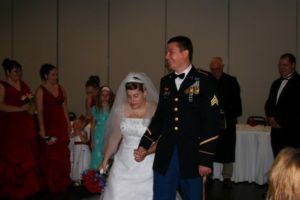 Thankfully for Nebraska Fellow Sarah Lease, her husband’s first impression did not have a lasting effect on her. “David and I met four months after her got shot. He came to Nebraska to visit his cousin who is my friend. My first impression of him was not favorable. I thought he was weird…” So how did it turn out? “We are going on 8 years of marriage where we have had ups and downs but we are still going strong. That’s about as sappy as I can get because I am about the least sappy person ever!”
Thankfully for Nebraska Fellow Sarah Lease, her husband’s first impression did not have a lasting effect on her. “David and I met four months after her got shot. He came to Nebraska to visit his cousin who is my friend. My first impression of him was not favorable. I thought he was weird…” So how did it turn out? “We are going on 8 years of marriage where we have had ups and downs but we are still going strong. That’s about as sappy as I can get because I am about the least sappy person ever!”
Dating in the modern age, South Carolina Fellow Virginia Peacock, met her husband thanks to technology. “Dave and I met of all places on Match.com Yep, we are one of those stories!!! He was actually on deployment at the time in Washington D.C. at Andrews AFB flying soldiers home from Walter Reed/Bethesda. We talked for a month on the computer and then on the phone. On a free weekend, he drove all the way down to SC for our first date, telling me he had already planned to come to visit his family and take care of some business. We hit it off right away! Luckily, he was only in D.C. for another month and then came back to Charleston AFB. The rest is history!!”
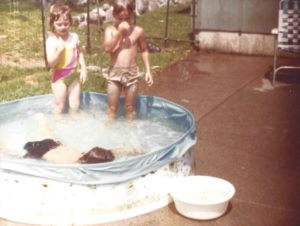 Indiana Fellow, Glenda Leary met her husband at Ft. Devens, MA when they were four and five years old. After Josh’s father came down on orders to Germany they lost touch for years, until high school. “After practice, my mom told me that Josh called and wanted to talk to me. To be quite honest, I forgot who he was. So, my mom reminded me of him. Josh called me back and we talked for a couple of hours. That conversation began the relationship. Our senior year, Josh flew down for my prom. That was the first time in eight years we’d see each other… After he committed to the AF, he proposed to me before he left for basic. And the rest is history.” Glenda also says that “despite his injuries/illnesses, Josh is the best thing that could have ever happened to me. I have no regrets with marrying him, period. So we’ll continue this part of his healing journey together.”
Indiana Fellow, Glenda Leary met her husband at Ft. Devens, MA when they were four and five years old. After Josh’s father came down on orders to Germany they lost touch for years, until high school. “After practice, my mom told me that Josh called and wanted to talk to me. To be quite honest, I forgot who he was. So, my mom reminded me of him. Josh called me back and we talked for a couple of hours. That conversation began the relationship. Our senior year, Josh flew down for my prom. That was the first time in eight years we’d see each other… After he committed to the AF, he proposed to me before he left for basic. And the rest is history.” Glenda also says that “despite his injuries/illnesses, Josh is the best thing that could have ever happened to me. I have no regrets with marrying him, period. So we’ll continue this part of his healing journey together.”
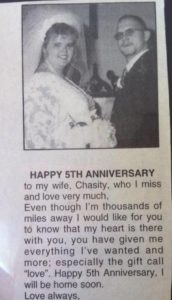 Minnesota Fellow, Kimberly Dub met her husband through a handwritten letter. “Rob and I will celebrate 22 years of marriage this year. While it hasn’t been the happily ever after we planned, we are still in love and we can confidently say “I still choose you.” We met when I was a college freshman participating in ROTC. If we showed up to PT on Friday mornings with a hand written letter addressed to “Any Service Member” we could return to the dorms and sleep. Rob was one of the service members that received a letter from me; we continued to write throughout his deployment and when he returned to the states, we began talking on the phone.” In the fall of 1991 Rob traveled to Minnesota so they could finally meet in person. “I will never forget the feeling of that first hug, standing at the end of my parent’s driveway while my parents peered out the living room window. We spent a few days together before he had to report for his new assignment. A month later, he flew back to Minnesota for Christmas and asked me to marry him! Rob served for 22 years before retiring and we are now living in Minnesota where our love story began.” Minnesota Fellow Kimberly Dub
Minnesota Fellow, Kimberly Dub met her husband through a handwritten letter. “Rob and I will celebrate 22 years of marriage this year. While it hasn’t been the happily ever after we planned, we are still in love and we can confidently say “I still choose you.” We met when I was a college freshman participating in ROTC. If we showed up to PT on Friday mornings with a hand written letter addressed to “Any Service Member” we could return to the dorms and sleep. Rob was one of the service members that received a letter from me; we continued to write throughout his deployment and when he returned to the states, we began talking on the phone.” In the fall of 1991 Rob traveled to Minnesota so they could finally meet in person. “I will never forget the feeling of that first hug, standing at the end of my parent’s driveway while my parents peered out the living room window. We spent a few days together before he had to report for his new assignment. A month later, he flew back to Minnesota for Christmas and asked me to marry him! Rob served for 22 years before retiring and we are now living in Minnesota where our love story began.” Minnesota Fellow Kimberly Dub
While her husband was deployed, Kentucky Fellow, Chasity Allen Tuggle’s husband surprised her with a heartfelt clipping in the local paper. He had limited access to the internet during this deployment and had worked with Chasity’s mom for a month to arrange this surprise.
If you would like to join the Elizabeth Dole Foundation’s Hidden Heroes Caregiver Community, please e-mail Emery@ElizabethDoleFoundation.org.
Independence Fund Caregiver Retreat #Hiddenheroes Blog
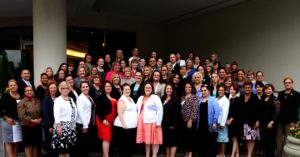 With a recent New Year Donation of $50,000 to the Elizabeth Dole Foundation and the establishment of four national caregiver retreats in 2015, the Independence Fund has expanded their vision to help our nation’s wounded warriors by supporting the hidden heroes who stand behind them.
With a recent New Year Donation of $50,000 to the Elizabeth Dole Foundation and the establishment of four national caregiver retreats in 2015, the Independence Fund has expanded their vision to help our nation’s wounded warriors by supporting the hidden heroes who stand behind them.
This past weekend (1/22/15-1/25/15) I had the opportunity, along with other Caregiver Fellows and military caregivers to attend the Inaugural Independence Fund Caregiver Retreat, in Point Clear, Alabama. I myself have never been on a caregiver retreat and to be able to spend a few days in the warm sun on the Gulf with other fabulous caregivers, was one of the greatest gifts I have received in a long time.
The retreat offered caregivers the opportunity to participate in hypnotherapy for stress management, a spa date, in-town excursions, a wonderful cooking demonstration and most of all, the ability to just unwind. Many of us agreed that this trip was much needed. Very rarely are we allowed to completely relax; personally, I have not had over 24 hours to myself since my husband was hospitalized. The Independence Fund helped us caregivers immensely this past weekend through this retreat. So on behalf of everyone who attended with me, thank you Independence Fund!
For upcoming Independence Fund Caregiver Retreats, please visit their website and/or sign up for the Hidden Heroes Caregiver Community by e-mailing Emery@ElizabethDoleFoundation.org and the information will be released when it becomes available.
~ Emery Popoloski
Hidden Heroes Caregiver Community Program Coordinator
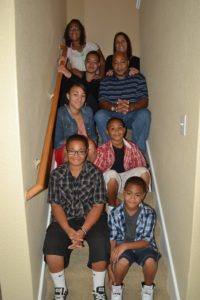 Moving Forward With the Help of Operation Homefront
Moving Forward With the Help of Operation Homefront
By Betty Easley and Melissa Comeau
Elizabeth Dole Fellows Betty Easley and Melissa Comeau share their caregiving stories and detail their positive experiences with Foundation coalition partner, Operation Homefront, as they made their transitions from military to civilian life.
Betty Easley’s story with Operation Homefront began immediately following her husband’s retirement from the military, when they were in desperate need for a new home and a new beginning:
“My husband had taken off the military uniform for the last time as a wounded warrior. We survived two tours to Iraq, and now our family of eight was ready for a new beginning. Due to behavior problems caused by his invisible wounds, my husband had been demoted twice, resulting in “no pay dues.” This meant, we had no money coming in.
“We left our final duty station in Germany and moved to San Antonio, Texas in August, 2010 with minimal resources and a list of medical conditions, which included both physical and invisible wounds of war. That was when I became a veteran caregiver.
“I was immediately thrust into the role of managing medications & doctor appointments, budgeting finances and navigating through a complicated veteran’s benefits system, all while providing emotional support to my husband and children.
“Operation Homefront’s Villages in San Antonio was the place we called home during our transition from military to civilian life. We were able to attend marriage classes, receive financial coaching, attend weekly PTSD support groups, and attend regular Bible studies to strengthen our faith in addition to receiving emergency financial assistance.
“I am extremely grateful to Operation Homefront for their helping hand. It was their intervention that helped our family transform from being homeless to homeowners. Their partnerships with the Home Depot Foundation and Wells Fargo made it possible for our family to receive a newly renovated, mortgage free home. Our dream of owning a home wouldn’t have been possible without the help and support of these organizations joining forces and caring for military families.”
For Melissa Comeau, Operation Homefront helped ease her worries and make her existing home a safer place for her husband:
“I applied for a home repair soon after learning about the Operation Homefront program designed to help Wounded Warriors be more comfortable in their homes. There are four different types of flooring on one level of our home, which is a major trip hazard for my husband. He has Traumatic Brain Injury (TBI) which contributes to balance issues and gait problems. The problem with our floors was extensive and he has tripped and fallen on a few occasions.
“Upon applying to Operation Homefront, I gathered all of the necessary documents and quotes into my application, and once I had the correct documentation I was assigned a lovely case manager, Michelle, who treated me with the utmost respect and truly assisted me in every step of the process. She was gracious and kind, and exhibited care for the challenges my husband was facing as well as my concerns. Even though we had a couple hiccups with estimates, she took control of the situation and made sure we were taken care of.
“Michelle and I enjoyed a pleasant relationship over the course of our project. She made me laugh and always made me feel confident that the floors would be repaired. It took the contractor a week to complete the floor work and there were some added repairs during the project. Michelle kept in contact with me and worked with the contractor to make sure the work was completed perfectly.
“I am happy to report the floors are now completely level as well as beautiful. There are no more awkward seams, making our home safer for my husband. Operation Homefront fulfilled a great need for us, and as a caregiver it is one less thing I have to worry about, one less concern weighing on my already occupied mind. There are no words to express how much I appreciate this tremendous gift. Thank you Operation Homefront.”
WWP Retreat offers Respite, Reflection and Relaxation
By Melissa Comeau, Elizabeth Dole Fellow
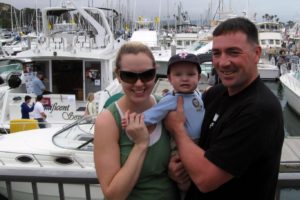 In June 2014, The Elizabeth Dole Fellows from several states met at the Seven Springs Resort in Pennsylvania for a team building retreat sponsored by Wounded Warrior Project (WWP). What was sure to be a fun filled weekend with Military and Veteran Caregivers transcended into a very profound and meaningful opportunity to bond.
In June 2014, The Elizabeth Dole Fellows from several states met at the Seven Springs Resort in Pennsylvania for a team building retreat sponsored by Wounded Warrior Project (WWP). What was sure to be a fun filled weekend with Military and Veteran Caregivers transcended into a very profound and meaningful opportunity to bond.
The RAND study commissioned by The Elizabeth Dole Foundation identified that only 47% of post 9/11 military and veteran caregivers have a caregiving network. More than half of the caregivers of military members and veterans don’t know other caregivers in their situation. When I became my husband’s caregiver, I found myself feeling very alone and thought no one would be able to understand what I was going through. I searched and searched for support and was lucky to have found online communities of military and veteran caregivers. Many of the support figures I found online are Elizabeth Dole Fellows and I treasure them for who they have been for me and continue to be as caregivers, friends, mentors, advocates and leaders. This retreat was a chance for me to meet face to face with the other Fellows and just hang out. Spending real time, having deep and meaningful conversations, laughing at the situations we have found ourselves in, tearing up as others shared such personal stories, just being together. For me, this made every second of the retreat valuable.
At the Seven Springs Resort, the Fellows were treated to education opportunities in the areas of communication and resiliency. We took full advantage of the professionals before us and asked many questions. The counsellors, Teri and Mike were also available for one on one attention and I know I was helped immensely with my concerns. Wounded Warrior Project also had Michael, a VA benefits liaison available for concerns about VA benefits. We were lucky to have such high quality support at this retreat.
The retreat also offered a chance for fun and relaxation. I signed up for Zip-lining because I wanted to try something new. I needed a little adventure. It was an honor to help the other Fellows overcoming the fear of heights and the unknown. Most of us will never forget our first Zip-line and the ladies we shared that experience with. I am proud we all survived. The retreat was also full of opportunities to relax and practice some self-care. The spa at the resort hosted ladies who wanted to be pampered. I admit I needed this as well so I treated myself to a massage and a pedicure. The chance to relax and feel special was precious to me. All too often, I put my caregiving duties, my motherly duties and the rest of our life ahead of myself. This gave me the time and place to take care of myself in a way that is near impossible at home.
The Fellows and I had fun at the team building exercises. We practiced problem-solving on a giant log, played triangle tag, sang songs and bonded as friends. We were lucky to have staff from The Elizabeth Dole Foundation with us on this journey. Both Carol and Lindi were there experiencing all of this with us. We had question and answer sessions, spoke about the goals of the foundation and got more of a sense of our role within the foundation. The retreat would not have been the same without them. I feel a more personal connection with everyone who attended this retreat and that was exactly the reason I wanted to attend.
Lastly, I have to thank Wounded Warrior Project for all of their support. The ladies running this retreat were exceptional. Andrea, Lisa and Angela are so wonderful and their involvement on the retreat made it second to none. All in all, I take away great memories, stronger friendships and a positive sense of wellbeing from this trip. I am so grateful to The Elizabeth Dole Foundation for this amazing opportunity and I can’t wait to see all the great things to come from the Foundation and its Fellows.
July 15
By Glenda Leary, Indiana Elizabeth Dole Fellow
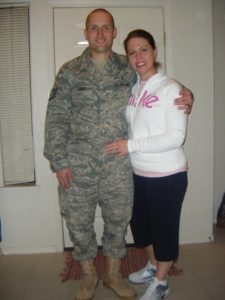 When I met my husband, I was only four years old and he was five. Our dads were in the Army when we first met. When we were little, we’d play “house” with each other. We’d pretend I was his wife, and he was my husband. Little did we know that in fifteen years, it would come true for us. However, as a little girl, I never imagined I would become a Caregiver for my husband. After four deployment tours, two of which were in Afghanistan, my husband would return with PTSD, mTBI, and Post-Traumatic Headaches. Now tell me, do you know of any little girl who aspires to be in that position as early as in her mid-30s? I sure wasn’t one of them.
When I met my husband, I was only four years old and he was five. Our dads were in the Army when we first met. When we were little, we’d play “house” with each other. We’d pretend I was his wife, and he was my husband. Little did we know that in fifteen years, it would come true for us. However, as a little girl, I never imagined I would become a Caregiver for my husband. After four deployment tours, two of which were in Afghanistan, my husband would return with PTSD, mTBI, and Post-Traumatic Headaches. Now tell me, do you know of any little girl who aspires to be in that position as early as in her mid-30s? I sure wasn’t one of them.
Dealing with a loved one who has combat injuries and illnesses has its challenging moments. My husband’s injury and illnesses have required numerous visits to the VA Hospital. It seems like we average 2-3 doctors’ visits a week, not to mention the several times he was admitted to the hospital for various reasons over the years. But at the end of the day, I’m truly blessed to have my husband in my life. I do not take that lightly either. See, when we were little, we’d also pretend he was my knight in shining armor. Ok, so he wore ABUs and BDUs instead of a Knight’s Armor, but he was my hero nevertheless, and still is to this day. The challenging moments can seem like a big hurdle to overcome, but with our faith in God, we are conquering them one baby step at a time.
Let me tell you what brightens my day the most. There has been several times that my husband is physically and mentally drained, but he perks his head up and simply says, “Thank You”. I cannot describe the joy in my heart when I hear those two words. There are times that I wonder if my caregiving abilities are worth it, and if I’m doing the right thing for him. I have to admit, I’m a bit of a perfectionist so I want to make sure I’m giving my all to ensure he receives the best care from his doctors, as well as the assistance I provide him. However, when I hear my husband say, “thank you”, I know I’m on the right path.
Raising three children in an environment with a Wounded Warrior might seem like a sad situation for the kids. However, I have learned that my children have bonded with their dad more since he has become disabled than when he was on Active Duty. Now I’m not suggesting that they didn’t love their dad when he was I the military, because that is far from the truth. What I’m stating is that there is a mutual understanding of the challenges their dad faces, which strengthens the bond with their dad. My children have become his caregivers as well. They assist him with simple tasks like carrying his coffee for him, giving him a simple hug when he feels low, or turning the lights off when he cannot stand the light in his eyes. I couldn’t be more proud of my children. They help their dad simply because they love him. And what is amazing, my husband strives to be part of their lives as much as possible. The bond that they formed cannot be broken. For that, I’m truly grateful.
I’m not suggesting that we do not have hurdles in life. I could take a moment to list the countless times I’ve felt let down, frustrated with his medical care, being alone in a non-military community that doesn’t understand our situation, or simply not having the time to take care of myself. But this is not what I want my legacy as a caregiver to be. Rather, I chose fall on my faith in hard times. Because reading is time-consuming and I simply do not have enough hours in the day to read my Bible, I turn to Christian music to brighten my day. Sure it seems a little nuts, but it is a tool I use to keep going. My favorite song, “Overcomer” is written by Mandisa. She talks about being an overcomer of all of the negative circumstances in your life. It’s not about pretending that everything is ok, it’s about facing those challenges head on, and knowing that God will help you succeed in them. (And if you see me in the gym, with my headphones on, you can bet that I’ve listened to that song at least 2 or 3 times, as it is my uplifting song.) My husband and I face the challenges associated with PTSD, mTBI, and Post-Traumatic headaches as a team. We know that God is in control of our lives. And that in the darkest of moments, God is right in the midst of our challenges. This is what keeps us carrying on in his recovery phase of life.
Back to our childhood days. While I never imagined Josh would become disabled, we see past his injuries to see the man he is today. And I am so blessed and honored to be his wife and caregiver. He’s truly an American Hero who has served this Nation to the best of his ability and with honor. I will be by his side until the day I die, striving for him to get the best care he can and to keep him smiling in his darkest of days. This is not the lifestyle I dreamed of when I was a little girl, but since we are dealing with the here and now, I couldn’t imagine not being by his side to help him in this manner. He will forever be my Hero, and I’m the one who is truly blessed.
May 15th
By Virginia Peacock, South Carolina Elizabeth Dole Fellow
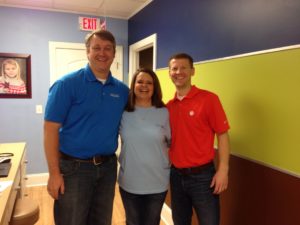 When I left the workforce last July, it was with a heavy heart for many reasons: the loss of my 22 yr nursing career, the loss of my identity, the loss of a support group and the loss of patients that I had grown to love like my own children. I knew leaving to take care of Dave was the right thing for our family, but I was so sad.
When I left the workforce last July, it was with a heavy heart for many reasons: the loss of my 22 yr nursing career, the loss of my identity, the loss of a support group and the loss of patients that I had grown to love like my own children. I knew leaving to take care of Dave was the right thing for our family, but I was so sad.
Then, an angel sent me a message on facebook and said that they would love for me to come and work in their pediatric practice (when our life calmed down) for as many, or as few days a week as I wanted.
I have known the pediatricians who own Lake Murray Pediatrics, Kyle Guyton and Joey Delaney, since they were medical students. They were there for me though my divorce from my first husband, always checking on me and my son. They teased me through dating and celebrated when I met Dave. I was there for them when they had their babies and gave them their first shots. Joey and Kyle and their wives are the best, and we have always kept in touch.
When Kyle’s wife, Sarah, saw I was leaving my job and why I was having to leave, she reached out…somehow knowing I needed a life line.
Some weeks I work 2 days, some weeks none. They always work around my schedule and are thankful for whatever I can do. I am ALWAYS welcomed and supported. Their staff is the best, and I laugh more when I am with them than I have in a while. The kids that come into the practice brighten my days.
People don’t understand that this job is my escape…it’s like a spa day for me.
Kyle, Joey and Sarah didn’t have to do this. They did it because they respect Dave’s sacrifice and they are great people.
This is the kind of out of the box thinking that the RAND study encourages. I will be able to keep my nursing license, and keep my skills up, all while working in a positive and encouraging environment.
It is my hope that other employers will offer similar opportunities to other caregivers. I know this has improved my life and thus, my husband and son’s life and that is what this is all about.









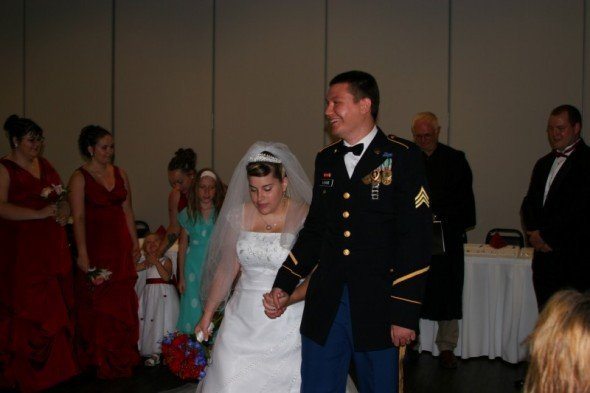

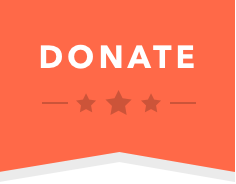
Follow Us